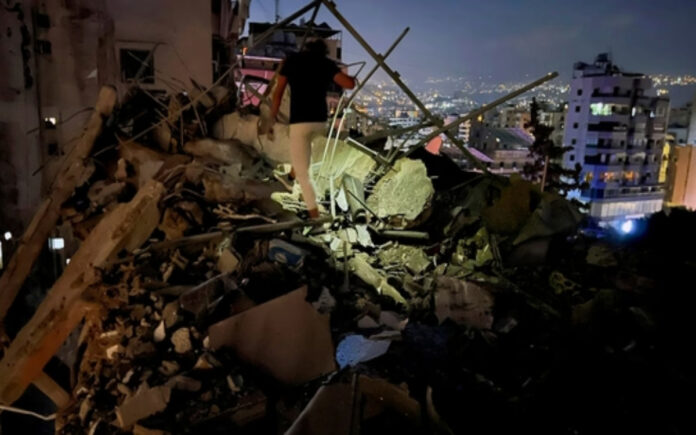Beirut: Late on Tuesday, an Israeli air strike hit a senior Hezbollah commander in the southern suburbs of Beirut. The Israeli military confirmed the strike was a retaliatory action following a cross-border rocket attack three days prior, which claimed the lives of 12 children and teenagers.
A Reuters witness reported a loud explosion and a plume of smoke rising from the southern suburbs, a known stronghold of the Iran-backed Lebanese group Hezbollah, around 7:40 p.m. local time (16:40 GMT). According to a senior Lebanese security source, the air strike targeted a senior Hezbollah commander, though his current status remains unknown.
Lebanon’s state-run national news agency indicated that the air strike focused on the area around Hezbollah’s Shura Council in the Haret Hreik neighborhood of Beirut. The city has been on high alert in anticipation of Israeli retaliation for the rocket attack on the Israeli-occupied Golan Heights that resulted in the deaths of the 12 young victims in a Druze village football field.
Hezbollah has denied any involvement in the rocket attack.
In a statement, the Israeli military described the operation as a “targeted strike in Beirut against the commander responsible for the murder of the children in Majdal Shams and the killing of numerous additional Israeli civilians.” Further details are expected to be released.
Earlier on Tuesday, additional rocket fire from south Lebanon resulted in the death of a civilian in a kibbutz in northern Israel, according to medics.
Just prior to the explosion in south Beirut, the Israeli military reported that 15 projectiles were fired across the Lebanese border in the hours leading up to the incident, impacting parts of the Upper Galilee region without causing injuries.
The Israeli Air Force also targeted a Hezbollah observation post and “terror infrastructure” in south Lebanon earlier.
Also Read | Simone Biles Guides U.S. Gymnastics Team to Gold at Paris Olympics
Rising Escalation Concerns
Diplomatic efforts are underway to manage the situation. U.S. Defense Secretary Lloyd Austin expressed skepticism about the inevitability of a broader conflict between Hezbollah and Israel but voiced concerns over potential escalation.
Hezbollah and Israel, which last engaged in major conflict in 2006, have been exchanging fire since the Gaza war erupted in October. Hezbollah’s attacks on Israeli targets have been framed as acts of solidarity with the Palestinians.
While hostilities have largely been confined to the border region, there are growing concerns about the risk of a wider confrontation. On Tuesday, the Israeli military reported that 10 rockets were fired from Lebanon, with one hitting Kibbutz Hagoshrim and causing a fatality. The victim, a 30-year-old male, succumbed to shrapnel wounds.
In response, Israel claimed to have struck around 10 Hezbollah targets in south Lebanon overnight, resulting in the death of one Hezbollah fighter. Hezbollah confirmed the loss of one of its fighters in these retaliatory strikes.



